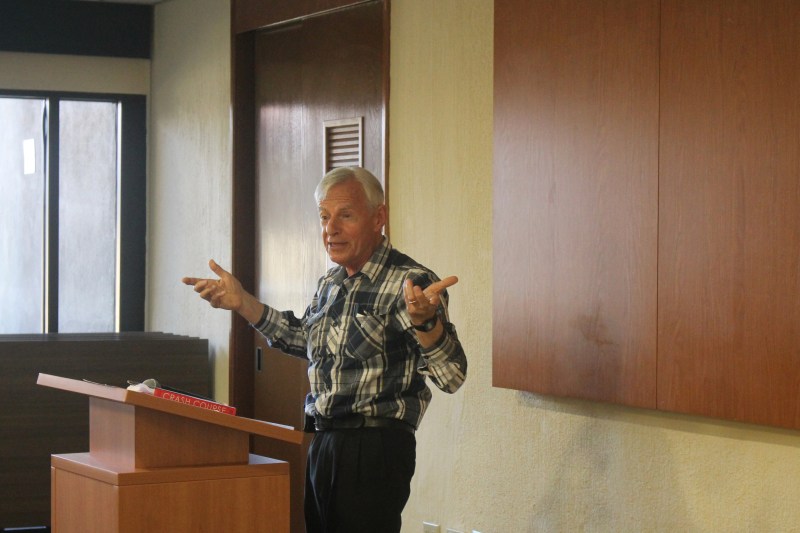H. Bruce Franklin is used to being perceived as a threat — he was blacklisted from university hirings across the country for three years after his dismissal from his tenured English professorship at Stanford and targeted by the Federal Bureau of Investigation (FBI). But the real threat, he told The Daily, “was the truth about our [nation’s] history.”
Franklin’s 2018 memoir “Crash Course: From the Good War to the Forever War,” which he presented Wednesday afternoon at a book talk in Margaret Jacks Hall, details his experience with America’s wartime history through his years as an Air Force officer in the Strategic Air Command, then as a professor and anti-war activist.
The book talk, sponsored by the comparative literature department and the symbolic systems program, summarized Franklin’s experiences and discoveries of national lies as detailed in “Crash Course.”
Comparative literature professor David Palumbo-Liu introduced Franklin to an audience of around 45 as “one of the very most important scholar activists today, continuing the lifelong commitment of speaking truth to power.”
“Differing perceptions of reality: 1939-2019,” the name of the talk, echoes the similarly named section of the Stanford University Advisory Board’s published decision regarding Franklin’s dismissal. A section of the decision entitled “Differing Perceptions of Reality” read that Franklin based “his actions upon a different set of perceptions about the university and society from those of the majority of Stanford faculty members.” Many of these perceptions made their way into his popular course at Rutgers-Newark on the Vietnam War.
“The state of New Jersey paid me for teaching what I was fired for saying at Stanford,” Franklin told The Daily.
Public perceptions of reality, Franklin said, are closely intertwined with national history.
“Our consciousness does have a major role in forming our history,” he told The Daily. “At the same time…our perception of the history is continually reshaping our consciousness.” Franklin’s decision to write a memoir was a way to use his “own experience as a way of understanding the history.”
The history of the nation’s wartime policies, Franklin told The Daily, is inextricably linked with American foreign and domestic policy today and is necessary for understanding “all these things that are going on…Iran, Venezuela, North Korea…the war in Syria…the government of Libya…the invasion of Afghanistan.”
Franklin uses the term “America’s Forever War” in his book to describe the state of the nation following the end of the Cold War.
“This is a very divided nation right now,” Franklin said. “But on the other hand, and this is sort of strange, when you go to people on the right and people on the left, they all agree on one thing…This is a dysfunctional government, and this government does not represent us,” Franklin told The Daily.
“There’s a relationship between the divided nation and the Vietnam War,” he said in his talk, noting that survey respondents in 1972 began to express a general distrust of the government’s actions.
At the talk, Franklin described his journey from an “anti-communist” to an anti-war activist, involving discoveries about a number of covert operations and lies related to past American interventions in and creation of foreign governments, which are further detailed in the book. He said that the archival sources cited in his book “as much as possible” include online versions so that readers can verify the source.
Franklin discussed how at the publicly official beginning of World War II, despite President Roosevelt denouncing the bombing of cities, theories were already being developed for such a purpose.
He described Ho Chi Minh’s Sept. 2, 1945 public reading of the Declaration of Independence of the newly established Democratic Republic of Vietnam, based on the United States’ own Declaration of Independence. The half million in attendance cheered when American P-38 Lightning fighter-bombers flew over.
Unknown to them, Franklin said, the Truman administration had agreed to assist a French invasion, and British forces later released and re-armed Japanese soldiers. Every enlisted man on the American troopships signed a petition denouncing “their word—imperialism—and demanding to know why we are doing this.” But, Franklin said, “That’s not the history we were told.”
In 1958, when the U.S. invaded Lebanon, Franklin said a commanding officer presented a briefing on how Egypt, Syria and Iraq were overrun by communists, despite Iraq’s outlawing of the communist party.
“Our interventions have left a wake of destroyed nations, one after the other…Cambodia, Libya, Iraq,” he said.
Hardware itself presented a risk to American military service members, which Franklin wrote in his book was being kept secret by the Air Force and by Boeing. In two years, 58 B-47 bombers exploded. On one occasion, Franklin said at the talk, “We were just about to refuel…It blew up, right behind us…A lot of people in Buffalo saw.” A few days later, one blew up over Tulsa. The designs were “all about money rather than anything else,” he told The Daily.
Defense spending, Franklin said, is disproportionate to the rest of the budget and is equivalent to “almost as much as all the other countries in the world combined,” and stands between the nation and domestic priorities.
“All these wars are unwinnable wars,” Franklin said of military interventions since 1991.
“Our public education system is a disgrace, our healthcare system is one of the worst in the world, our infrastructure is falling apart, we have a dysfunctional government,” and the argument is that “we can’t afford it” because of the “diversion of funds” for a “new generation of nuclear weapons,” he said.
Questions from the audience spanned American policy in Latin America to interventionist policies of both Republican and Democratic presidents.
“They’re equally committed to empire,” Franklin said, referring to presidents of the two parties. “This may be the last election where we have any vestige left of democracy.”
Contact Elise Miller at elisejl ‘at’ stanford.edu.
